MOD003325 - Gosport War Memorial Hospital: Reputation Case Study
VerifiedAdded on 2023/05/30
|12
|2849
|463
Case Study
AI Summary
This case study analyzes the impact of a malpractice scandal involving the over-prescription of opioids on the reputation of Gosport War Memorial Hospital. The report examines the perspectives of patients and their relatives, media coverage, and the role of health sector regulators such as the NHS. The study highlights how the failure to address concerns initially and the subsequent media attention significantly damaged the hospital's reputation. Recommendations are made to restore public confidence through transparency and systematic changes. The case delves into the ethical considerations of patient care, the importance of regulatory oversight, and the influence of public relations in managing a crisis within a healthcare setting. The study concludes that a proactive and transparent approach is crucial for the hospital to rebuild trust and improve its standing in the community.
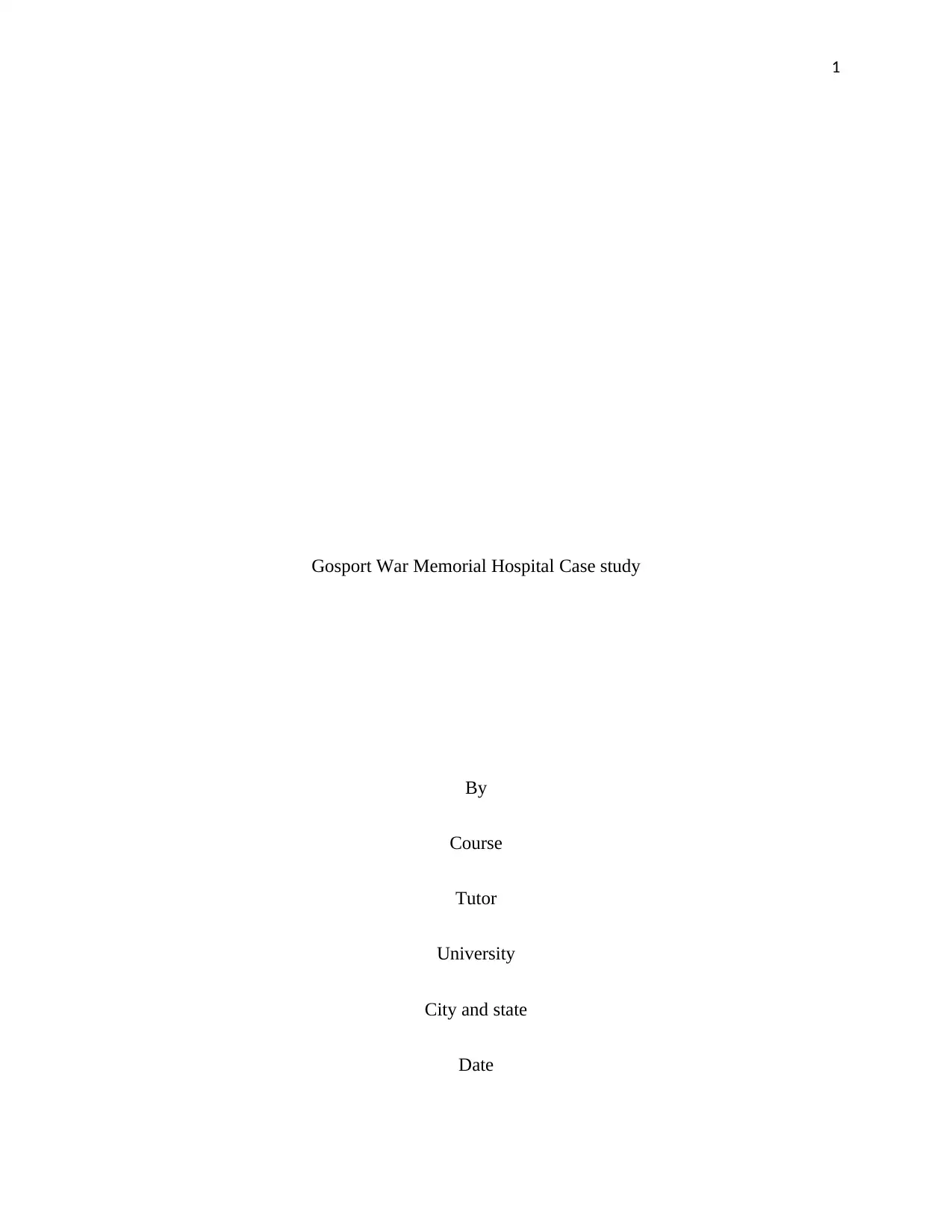
1
Gosport War Memorial Hospital Case study
By
Course
Tutor
University
City and state
Date
Gosport War Memorial Hospital Case study
By
Course
Tutor
University
City and state
Date
Paraphrase This Document
Need a fresh take? Get an instant paraphrase of this document with our AI Paraphraser
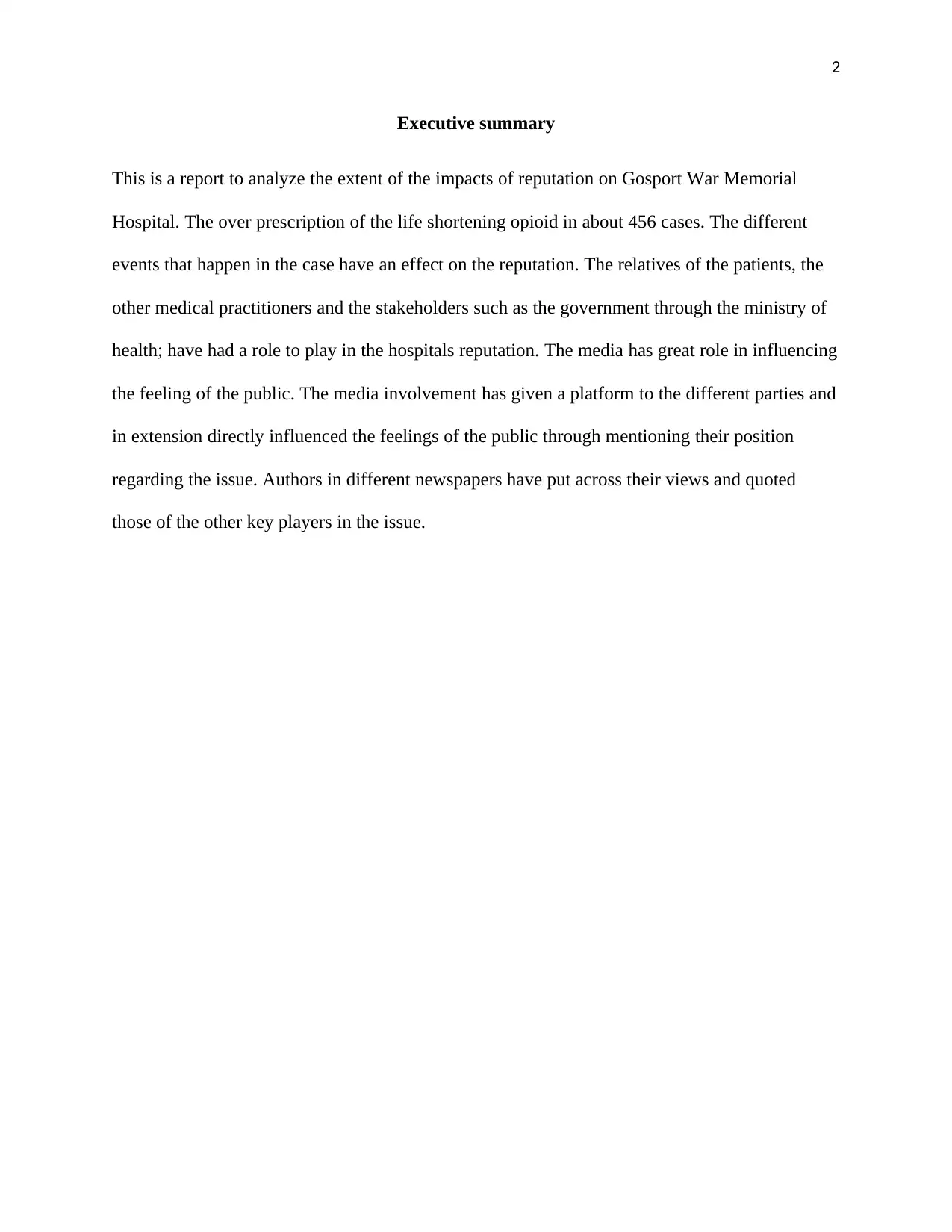
2
Executive summary
This is a report to analyze the extent of the impacts of reputation on Gosport War Memorial
Hospital. The over prescription of the life shortening opioid in about 456 cases. The different
events that happen in the case have an effect on the reputation. The relatives of the patients, the
other medical practitioners and the stakeholders such as the government through the ministry of
health; have had a role to play in the hospitals reputation. The media has great role in influencing
the feeling of the public. The media involvement has given a platform to the different parties and
in extension directly influenced the feelings of the public through mentioning their position
regarding the issue. Authors in different newspapers have put across their views and quoted
those of the other key players in the issue.
Executive summary
This is a report to analyze the extent of the impacts of reputation on Gosport War Memorial
Hospital. The over prescription of the life shortening opioid in about 456 cases. The different
events that happen in the case have an effect on the reputation. The relatives of the patients, the
other medical practitioners and the stakeholders such as the government through the ministry of
health; have had a role to play in the hospitals reputation. The media has great role in influencing
the feeling of the public. The media involvement has given a platform to the different parties and
in extension directly influenced the feelings of the public through mentioning their position
regarding the issue. Authors in different newspapers have put across their views and quoted
those of the other key players in the issue.
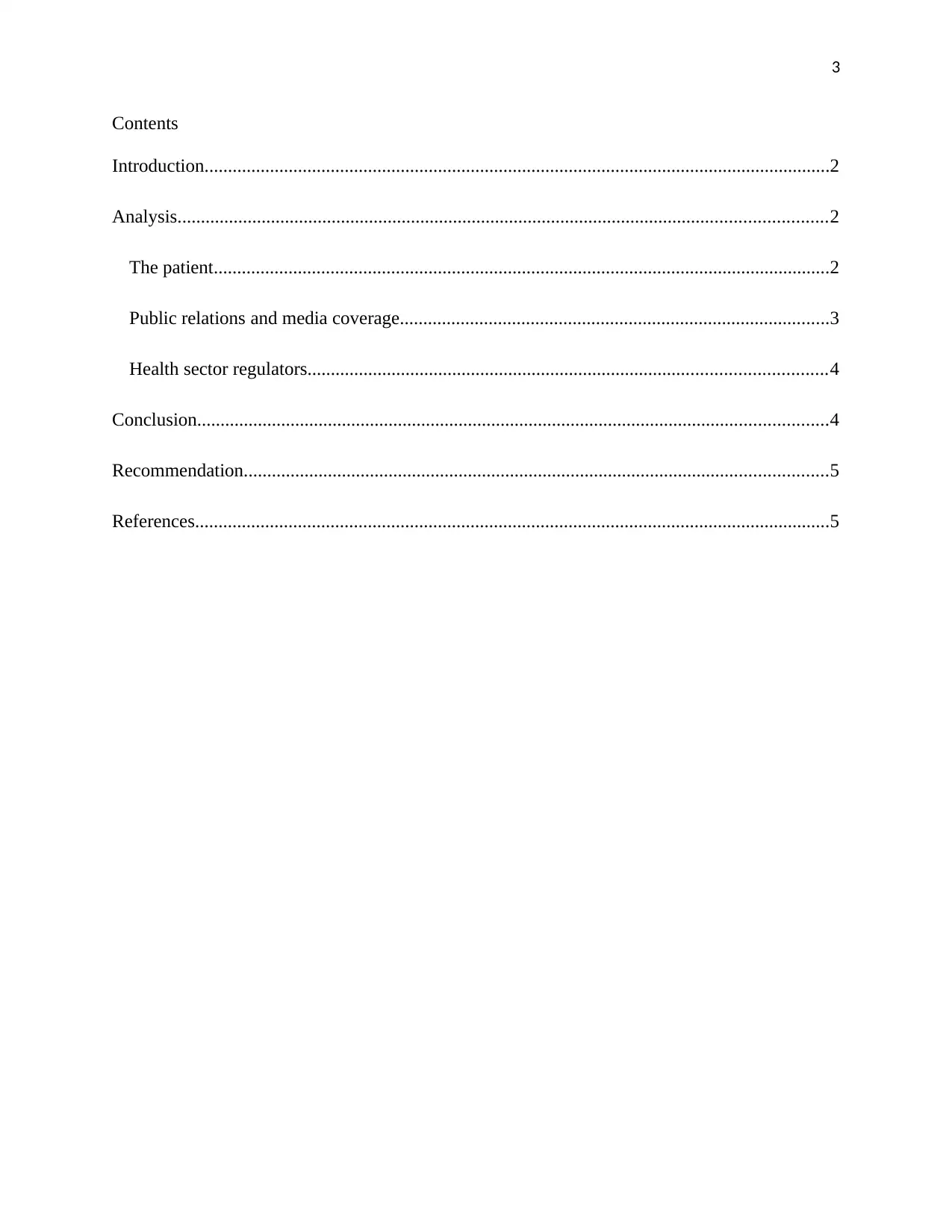
3
Contents
Introduction......................................................................................................................................2
Analysis...........................................................................................................................................2
The patient....................................................................................................................................2
Public relations and media coverage............................................................................................3
Health sector regulators...............................................................................................................4
Conclusion.......................................................................................................................................4
Recommendation.............................................................................................................................5
References........................................................................................................................................5
Contents
Introduction......................................................................................................................................2
Analysis...........................................................................................................................................2
The patient....................................................................................................................................2
Public relations and media coverage............................................................................................3
Health sector regulators...............................................................................................................4
Conclusion.......................................................................................................................................4
Recommendation.............................................................................................................................5
References........................................................................................................................................5
⊘ This is a preview!⊘
Do you want full access?
Subscribe today to unlock all pages.

Trusted by 1+ million students worldwide
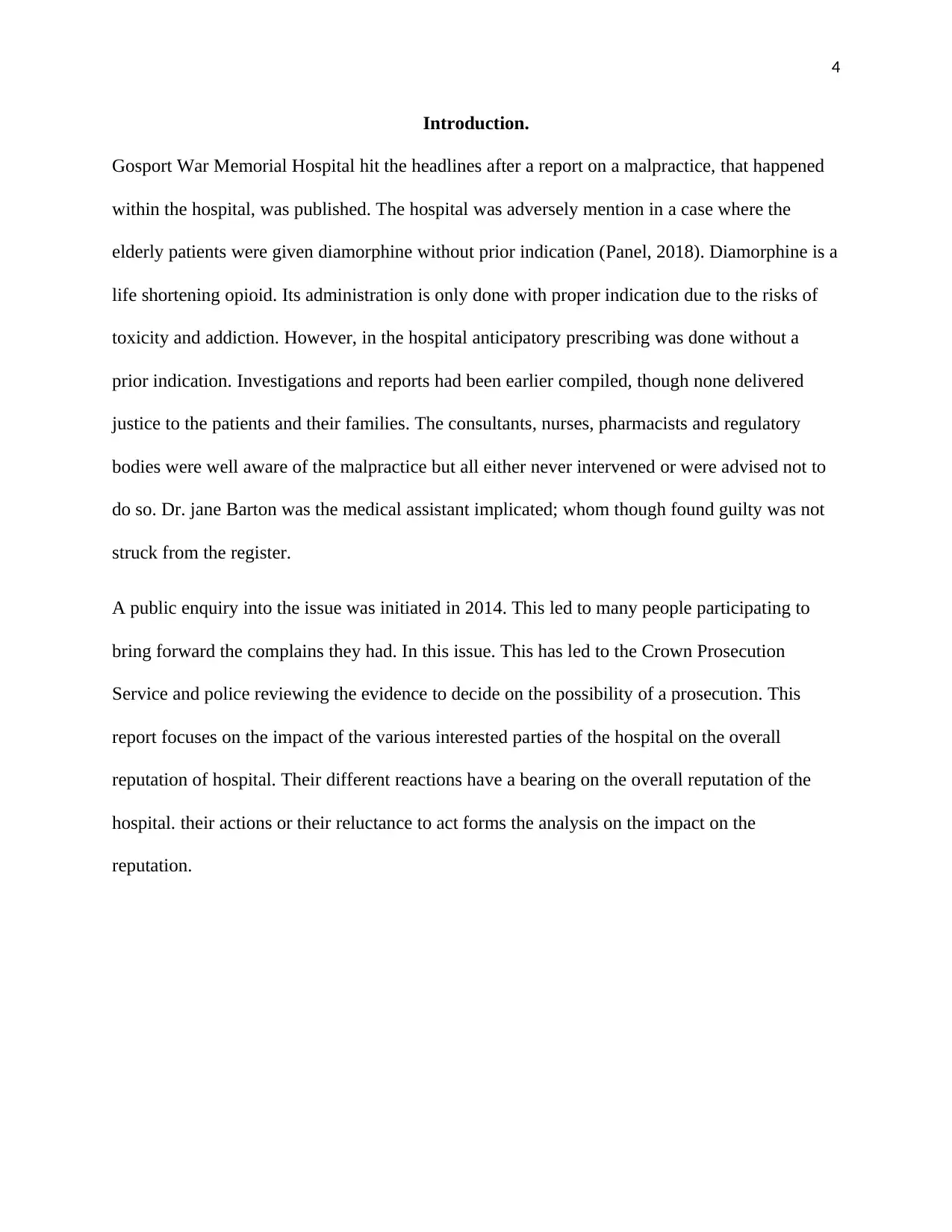
4
Introduction.
Gosport War Memorial Hospital hit the headlines after a report on a malpractice, that happened
within the hospital, was published. The hospital was adversely mention in a case where the
elderly patients were given diamorphine without prior indication (Panel, 2018). Diamorphine is a
life shortening opioid. Its administration is only done with proper indication due to the risks of
toxicity and addiction. However, in the hospital anticipatory prescribing was done without a
prior indication. Investigations and reports had been earlier compiled, though none delivered
justice to the patients and their families. The consultants, nurses, pharmacists and regulatory
bodies were well aware of the malpractice but all either never intervened or were advised not to
do so. Dr. jane Barton was the medical assistant implicated; whom though found guilty was not
struck from the register.
A public enquiry into the issue was initiated in 2014. This led to many people participating to
bring forward the complains they had. In this issue. This has led to the Crown Prosecution
Service and police reviewing the evidence to decide on the possibility of a prosecution. This
report focuses on the impact of the various interested parties of the hospital on the overall
reputation of hospital. Their different reactions have a bearing on the overall reputation of the
hospital. their actions or their reluctance to act forms the analysis on the impact on the
reputation.
Introduction.
Gosport War Memorial Hospital hit the headlines after a report on a malpractice, that happened
within the hospital, was published. The hospital was adversely mention in a case where the
elderly patients were given diamorphine without prior indication (Panel, 2018). Diamorphine is a
life shortening opioid. Its administration is only done with proper indication due to the risks of
toxicity and addiction. However, in the hospital anticipatory prescribing was done without a
prior indication. Investigations and reports had been earlier compiled, though none delivered
justice to the patients and their families. The consultants, nurses, pharmacists and regulatory
bodies were well aware of the malpractice but all either never intervened or were advised not to
do so. Dr. jane Barton was the medical assistant implicated; whom though found guilty was not
struck from the register.
A public enquiry into the issue was initiated in 2014. This led to many people participating to
bring forward the complains they had. In this issue. This has led to the Crown Prosecution
Service and police reviewing the evidence to decide on the possibility of a prosecution. This
report focuses on the impact of the various interested parties of the hospital on the overall
reputation of hospital. Their different reactions have a bearing on the overall reputation of the
hospital. their actions or their reluctance to act forms the analysis on the impact on the
reputation.
Paraphrase This Document
Need a fresh take? Get an instant paraphrase of this document with our AI Paraphraser
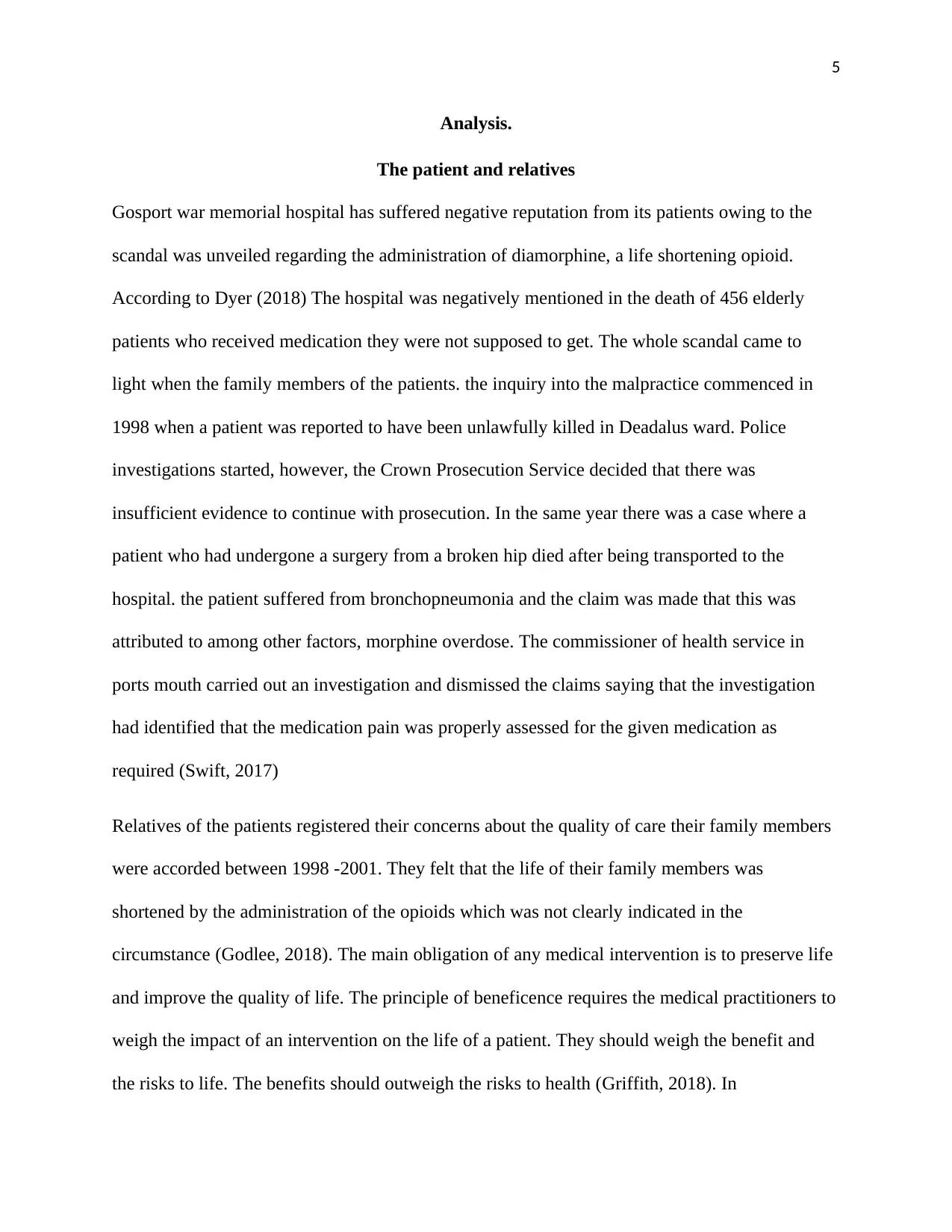
5
Analysis.
The patient and relatives
Gosport war memorial hospital has suffered negative reputation from its patients owing to the
scandal was unveiled regarding the administration of diamorphine, a life shortening opioid.
According to Dyer (2018) The hospital was negatively mentioned in the death of 456 elderly
patients who received medication they were not supposed to get. The whole scandal came to
light when the family members of the patients. the inquiry into the malpractice commenced in
1998 when a patient was reported to have been unlawfully killed in Deadalus ward. Police
investigations started, however, the Crown Prosecution Service decided that there was
insufficient evidence to continue with prosecution. In the same year there was a case where a
patient who had undergone a surgery from a broken hip died after being transported to the
hospital. the patient suffered from bronchopneumonia and the claim was made that this was
attributed to among other factors, morphine overdose. The commissioner of health service in
ports mouth carried out an investigation and dismissed the claims saying that the investigation
had identified that the medication pain was properly assessed for the given medication as
required (Swift, 2017)
Relatives of the patients registered their concerns about the quality of care their family members
were accorded between 1998 -2001. They felt that the life of their family members was
shortened by the administration of the opioids which was not clearly indicated in the
circumstance (Godlee, 2018). The main obligation of any medical intervention is to preserve life
and improve the quality of life. The principle of beneficence requires the medical practitioners to
weigh the impact of an intervention on the life of a patient. They should weigh the benefit and
the risks to life. The benefits should outweigh the risks to health (Griffith, 2018). In
Analysis.
The patient and relatives
Gosport war memorial hospital has suffered negative reputation from its patients owing to the
scandal was unveiled regarding the administration of diamorphine, a life shortening opioid.
According to Dyer (2018) The hospital was negatively mentioned in the death of 456 elderly
patients who received medication they were not supposed to get. The whole scandal came to
light when the family members of the patients. the inquiry into the malpractice commenced in
1998 when a patient was reported to have been unlawfully killed in Deadalus ward. Police
investigations started, however, the Crown Prosecution Service decided that there was
insufficient evidence to continue with prosecution. In the same year there was a case where a
patient who had undergone a surgery from a broken hip died after being transported to the
hospital. the patient suffered from bronchopneumonia and the claim was made that this was
attributed to among other factors, morphine overdose. The commissioner of health service in
ports mouth carried out an investigation and dismissed the claims saying that the investigation
had identified that the medication pain was properly assessed for the given medication as
required (Swift, 2017)
Relatives of the patients registered their concerns about the quality of care their family members
were accorded between 1998 -2001. They felt that the life of their family members was
shortened by the administration of the opioids which was not clearly indicated in the
circumstance (Godlee, 2018). The main obligation of any medical intervention is to preserve life
and improve the quality of life. The principle of beneficence requires the medical practitioners to
weigh the impact of an intervention on the life of a patient. They should weigh the benefit and
the risks to life. The benefits should outweigh the risks to health (Griffith, 2018). In
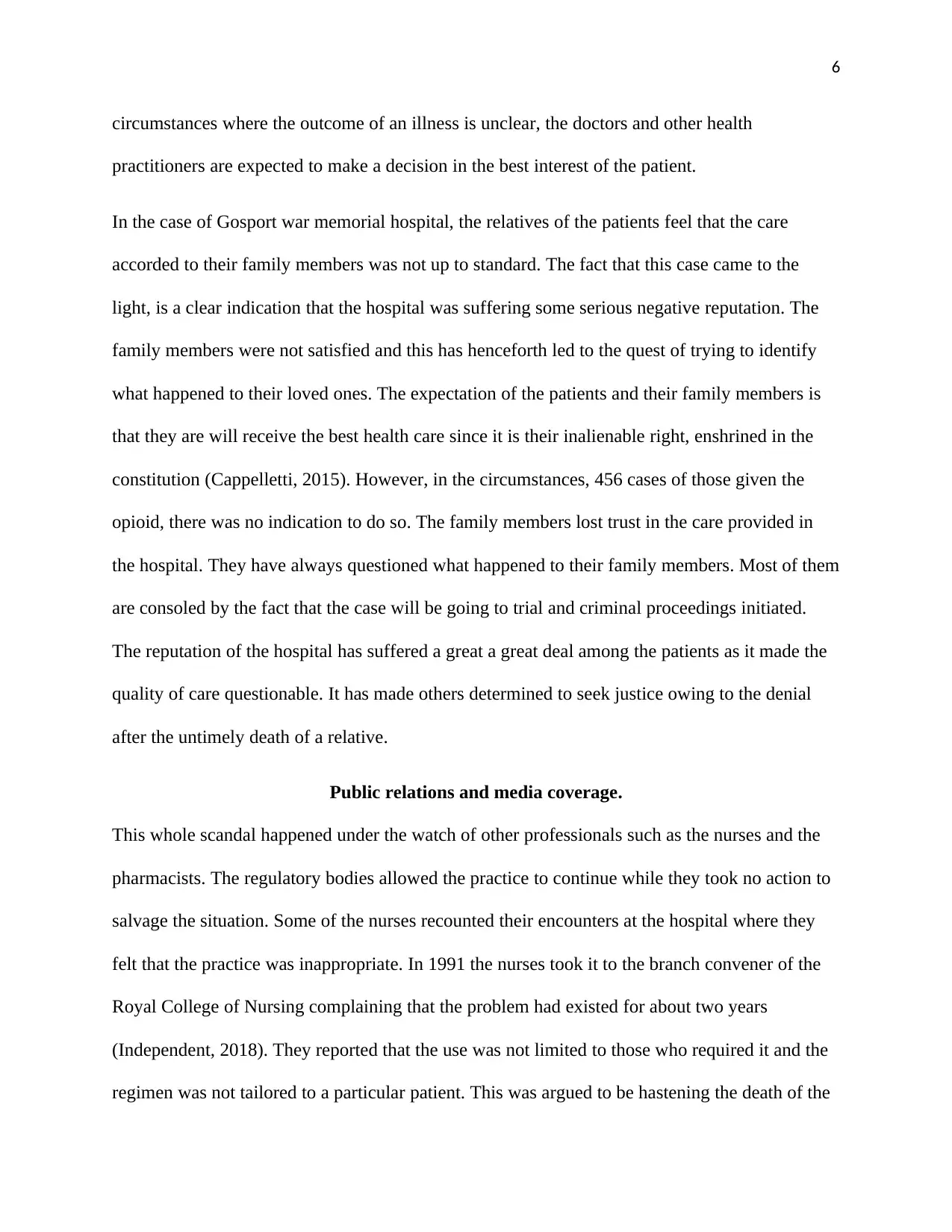
6
circumstances where the outcome of an illness is unclear, the doctors and other health
practitioners are expected to make a decision in the best interest of the patient.
In the case of Gosport war memorial hospital, the relatives of the patients feel that the care
accorded to their family members was not up to standard. The fact that this case came to the
light, is a clear indication that the hospital was suffering some serious negative reputation. The
family members were not satisfied and this has henceforth led to the quest of trying to identify
what happened to their loved ones. The expectation of the patients and their family members is
that they are will receive the best health care since it is their inalienable right, enshrined in the
constitution (Cappelletti, 2015). However, in the circumstances, 456 cases of those given the
opioid, there was no indication to do so. The family members lost trust in the care provided in
the hospital. They have always questioned what happened to their family members. Most of them
are consoled by the fact that the case will be going to trial and criminal proceedings initiated.
The reputation of the hospital has suffered a great a great deal among the patients as it made the
quality of care questionable. It has made others determined to seek justice owing to the denial
after the untimely death of a relative.
Public relations and media coverage.
This whole scandal happened under the watch of other professionals such as the nurses and the
pharmacists. The regulatory bodies allowed the practice to continue while they took no action to
salvage the situation. Some of the nurses recounted their encounters at the hospital where they
felt that the practice was inappropriate. In 1991 the nurses took it to the branch convener of the
Royal College of Nursing complaining that the problem had existed for about two years
(Independent, 2018). They reported that the use was not limited to those who required it and the
regimen was not tailored to a particular patient. This was argued to be hastening the death of the
circumstances where the outcome of an illness is unclear, the doctors and other health
practitioners are expected to make a decision in the best interest of the patient.
In the case of Gosport war memorial hospital, the relatives of the patients feel that the care
accorded to their family members was not up to standard. The fact that this case came to the
light, is a clear indication that the hospital was suffering some serious negative reputation. The
family members were not satisfied and this has henceforth led to the quest of trying to identify
what happened to their loved ones. The expectation of the patients and their family members is
that they are will receive the best health care since it is their inalienable right, enshrined in the
constitution (Cappelletti, 2015). However, in the circumstances, 456 cases of those given the
opioid, there was no indication to do so. The family members lost trust in the care provided in
the hospital. They have always questioned what happened to their family members. Most of them
are consoled by the fact that the case will be going to trial and criminal proceedings initiated.
The reputation of the hospital has suffered a great a great deal among the patients as it made the
quality of care questionable. It has made others determined to seek justice owing to the denial
after the untimely death of a relative.
Public relations and media coverage.
This whole scandal happened under the watch of other professionals such as the nurses and the
pharmacists. The regulatory bodies allowed the practice to continue while they took no action to
salvage the situation. Some of the nurses recounted their encounters at the hospital where they
felt that the practice was inappropriate. In 1991 the nurses took it to the branch convener of the
Royal College of Nursing complaining that the problem had existed for about two years
(Independent, 2018). They reported that the use was not limited to those who required it and the
regimen was not tailored to a particular patient. This was argued to be hastening the death of the
⊘ This is a preview!⊘
Do you want full access?
Subscribe today to unlock all pages.

Trusted by 1+ million students worldwide
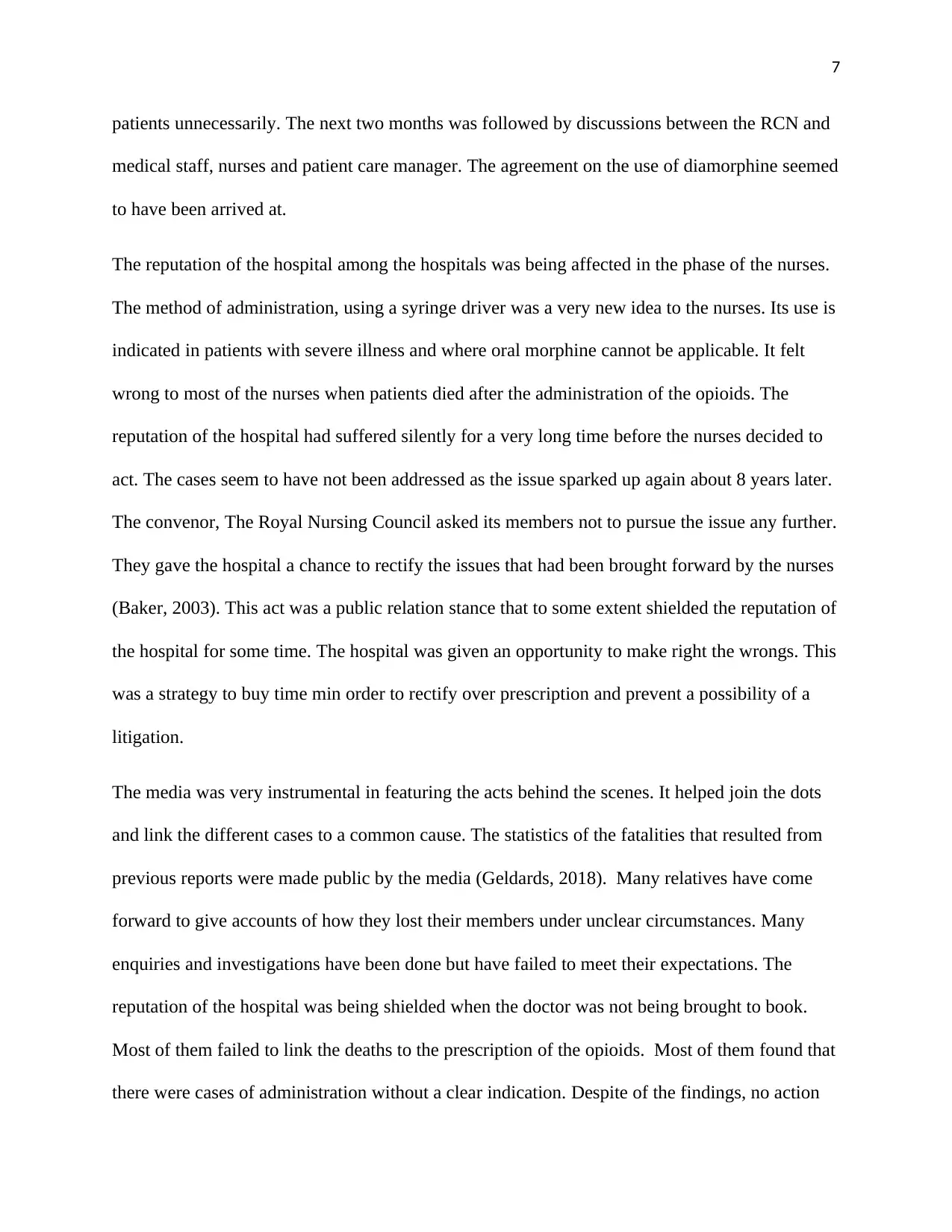
7
patients unnecessarily. The next two months was followed by discussions between the RCN and
medical staff, nurses and patient care manager. The agreement on the use of diamorphine seemed
to have been arrived at.
The reputation of the hospital among the hospitals was being affected in the phase of the nurses.
The method of administration, using a syringe driver was a very new idea to the nurses. Its use is
indicated in patients with severe illness and where oral morphine cannot be applicable. It felt
wrong to most of the nurses when patients died after the administration of the opioids. The
reputation of the hospital had suffered silently for a very long time before the nurses decided to
act. The cases seem to have not been addressed as the issue sparked up again about 8 years later.
The convenor, The Royal Nursing Council asked its members not to pursue the issue any further.
They gave the hospital a chance to rectify the issues that had been brought forward by the nurses
(Baker, 2003). This act was a public relation stance that to some extent shielded the reputation of
the hospital for some time. The hospital was given an opportunity to make right the wrongs. This
was a strategy to buy time min order to rectify over prescription and prevent a possibility of a
litigation.
The media was very instrumental in featuring the acts behind the scenes. It helped join the dots
and link the different cases to a common cause. The statistics of the fatalities that resulted from
previous reports were made public by the media (Geldards, 2018). Many relatives have come
forward to give accounts of how they lost their members under unclear circumstances. Many
enquiries and investigations have been done but have failed to meet their expectations. The
reputation of the hospital was being shielded when the doctor was not being brought to book.
Most of them failed to link the deaths to the prescription of the opioids. Most of them found that
there were cases of administration without a clear indication. Despite of the findings, no action
patients unnecessarily. The next two months was followed by discussions between the RCN and
medical staff, nurses and patient care manager. The agreement on the use of diamorphine seemed
to have been arrived at.
The reputation of the hospital among the hospitals was being affected in the phase of the nurses.
The method of administration, using a syringe driver was a very new idea to the nurses. Its use is
indicated in patients with severe illness and where oral morphine cannot be applicable. It felt
wrong to most of the nurses when patients died after the administration of the opioids. The
reputation of the hospital had suffered silently for a very long time before the nurses decided to
act. The cases seem to have not been addressed as the issue sparked up again about 8 years later.
The convenor, The Royal Nursing Council asked its members not to pursue the issue any further.
They gave the hospital a chance to rectify the issues that had been brought forward by the nurses
(Baker, 2003). This act was a public relation stance that to some extent shielded the reputation of
the hospital for some time. The hospital was given an opportunity to make right the wrongs. This
was a strategy to buy time min order to rectify over prescription and prevent a possibility of a
litigation.
The media was very instrumental in featuring the acts behind the scenes. It helped join the dots
and link the different cases to a common cause. The statistics of the fatalities that resulted from
previous reports were made public by the media (Geldards, 2018). Many relatives have come
forward to give accounts of how they lost their members under unclear circumstances. Many
enquiries and investigations have been done but have failed to meet their expectations. The
reputation of the hospital was being shielded when the doctor was not being brought to book.
Most of them failed to link the deaths to the prescription of the opioids. Most of them found that
there were cases of administration without a clear indication. Despite of the findings, no action
Paraphrase This Document
Need a fresh take? Get an instant paraphrase of this document with our AI Paraphraser
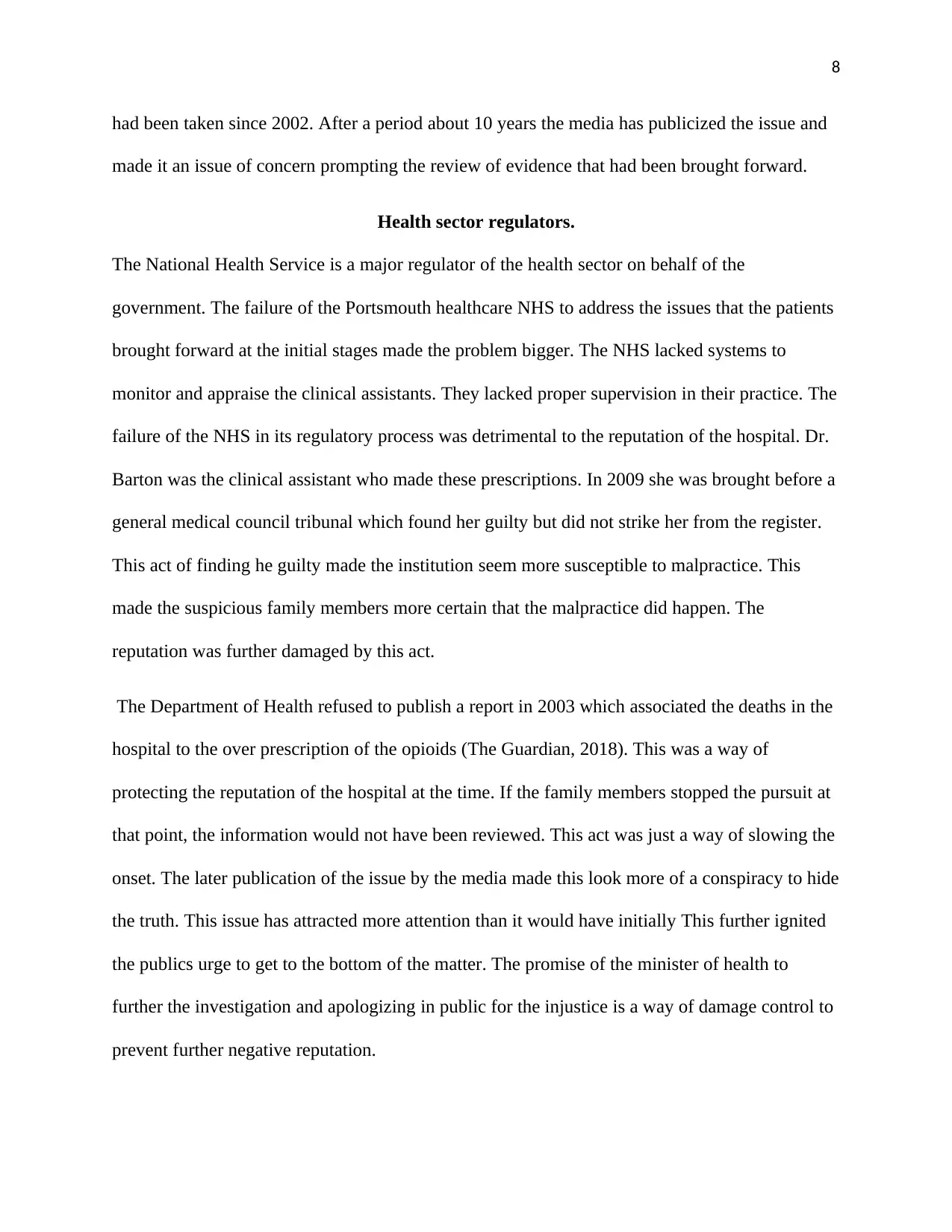
8
had been taken since 2002. After a period about 10 years the media has publicized the issue and
made it an issue of concern prompting the review of evidence that had been brought forward.
Health sector regulators.
The National Health Service is a major regulator of the health sector on behalf of the
government. The failure of the Portsmouth healthcare NHS to address the issues that the patients
brought forward at the initial stages made the problem bigger. The NHS lacked systems to
monitor and appraise the clinical assistants. They lacked proper supervision in their practice. The
failure of the NHS in its regulatory process was detrimental to the reputation of the hospital. Dr.
Barton was the clinical assistant who made these prescriptions. In 2009 she was brought before a
general medical council tribunal which found her guilty but did not strike her from the register.
This act of finding he guilty made the institution seem more susceptible to malpractice. This
made the suspicious family members more certain that the malpractice did happen. The
reputation was further damaged by this act.
The Department of Health refused to publish a report in 2003 which associated the deaths in the
hospital to the over prescription of the opioids (The Guardian, 2018). This was a way of
protecting the reputation of the hospital at the time. If the family members stopped the pursuit at
that point, the information would not have been reviewed. This act was just a way of slowing the
onset. The later publication of the issue by the media made this look more of a conspiracy to hide
the truth. This issue has attracted more attention than it would have initially This further ignited
the publics urge to get to the bottom of the matter. The promise of the minister of health to
further the investigation and apologizing in public for the injustice is a way of damage control to
prevent further negative reputation.
had been taken since 2002. After a period about 10 years the media has publicized the issue and
made it an issue of concern prompting the review of evidence that had been brought forward.
Health sector regulators.
The National Health Service is a major regulator of the health sector on behalf of the
government. The failure of the Portsmouth healthcare NHS to address the issues that the patients
brought forward at the initial stages made the problem bigger. The NHS lacked systems to
monitor and appraise the clinical assistants. They lacked proper supervision in their practice. The
failure of the NHS in its regulatory process was detrimental to the reputation of the hospital. Dr.
Barton was the clinical assistant who made these prescriptions. In 2009 she was brought before a
general medical council tribunal which found her guilty but did not strike her from the register.
This act of finding he guilty made the institution seem more susceptible to malpractice. This
made the suspicious family members more certain that the malpractice did happen. The
reputation was further damaged by this act.
The Department of Health refused to publish a report in 2003 which associated the deaths in the
hospital to the over prescription of the opioids (The Guardian, 2018). This was a way of
protecting the reputation of the hospital at the time. If the family members stopped the pursuit at
that point, the information would not have been reviewed. This act was just a way of slowing the
onset. The later publication of the issue by the media made this look more of a conspiracy to hide
the truth. This issue has attracted more attention than it would have initially This further ignited
the publics urge to get to the bottom of the matter. The promise of the minister of health to
further the investigation and apologizing in public for the injustice is a way of damage control to
prevent further negative reputation.
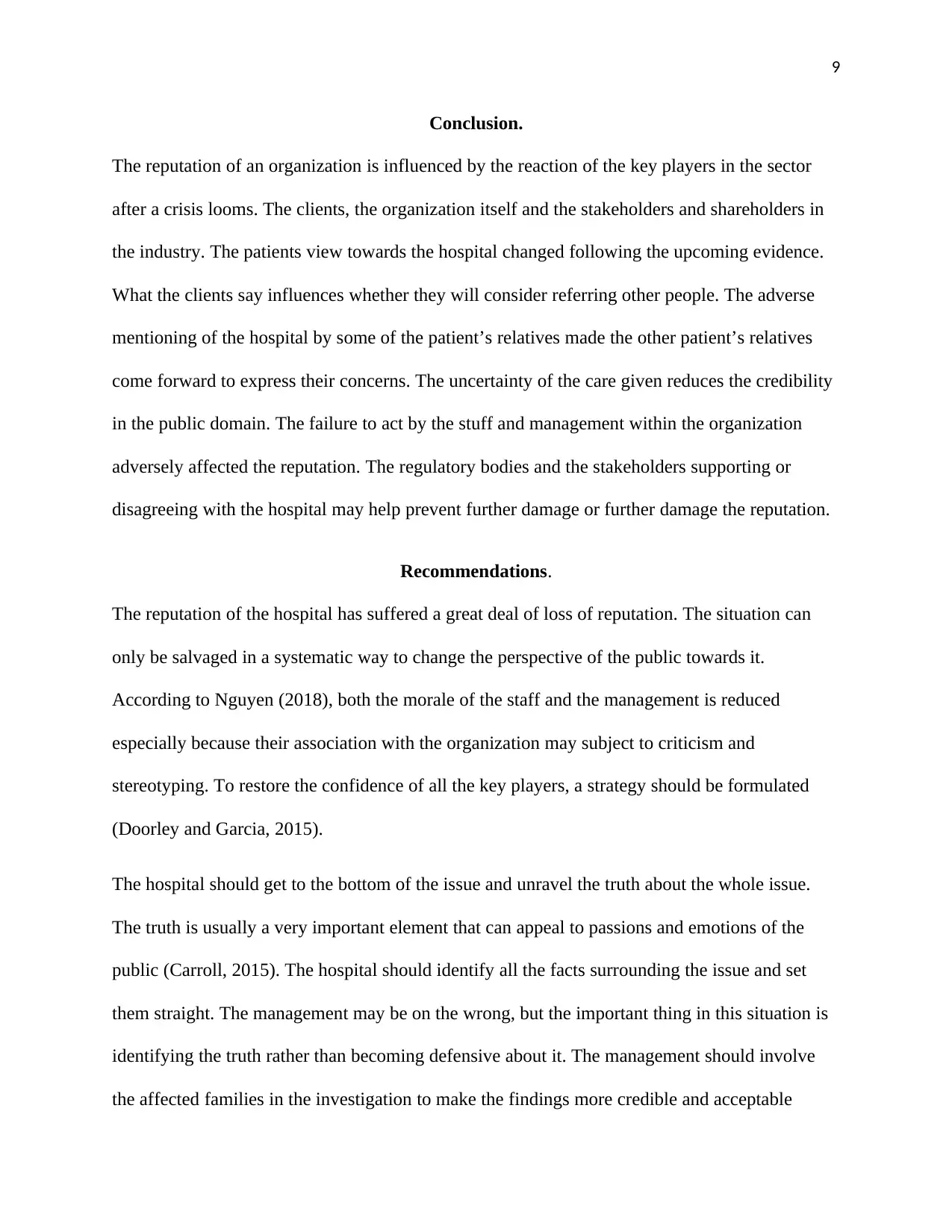
9
Conclusion.
The reputation of an organization is influenced by the reaction of the key players in the sector
after a crisis looms. The clients, the organization itself and the stakeholders and shareholders in
the industry. The patients view towards the hospital changed following the upcoming evidence.
What the clients say influences whether they will consider referring other people. The adverse
mentioning of the hospital by some of the patient’s relatives made the other patient’s relatives
come forward to express their concerns. The uncertainty of the care given reduces the credibility
in the public domain. The failure to act by the stuff and management within the organization
adversely affected the reputation. The regulatory bodies and the stakeholders supporting or
disagreeing with the hospital may help prevent further damage or further damage the reputation.
Recommendations.
The reputation of the hospital has suffered a great deal of loss of reputation. The situation can
only be salvaged in a systematic way to change the perspective of the public towards it.
According to Nguyen (2018), both the morale of the staff and the management is reduced
especially because their association with the organization may subject to criticism and
stereotyping. To restore the confidence of all the key players, a strategy should be formulated
(Doorley and Garcia, 2015).
The hospital should get to the bottom of the issue and unravel the truth about the whole issue.
The truth is usually a very important element that can appeal to passions and emotions of the
public (Carroll, 2015). The hospital should identify all the facts surrounding the issue and set
them straight. The management may be on the wrong, but the important thing in this situation is
identifying the truth rather than becoming defensive about it. The management should involve
the affected families in the investigation to make the findings more credible and acceptable
Conclusion.
The reputation of an organization is influenced by the reaction of the key players in the sector
after a crisis looms. The clients, the organization itself and the stakeholders and shareholders in
the industry. The patients view towards the hospital changed following the upcoming evidence.
What the clients say influences whether they will consider referring other people. The adverse
mentioning of the hospital by some of the patient’s relatives made the other patient’s relatives
come forward to express their concerns. The uncertainty of the care given reduces the credibility
in the public domain. The failure to act by the stuff and management within the organization
adversely affected the reputation. The regulatory bodies and the stakeholders supporting or
disagreeing with the hospital may help prevent further damage or further damage the reputation.
Recommendations.
The reputation of the hospital has suffered a great deal of loss of reputation. The situation can
only be salvaged in a systematic way to change the perspective of the public towards it.
According to Nguyen (2018), both the morale of the staff and the management is reduced
especially because their association with the organization may subject to criticism and
stereotyping. To restore the confidence of all the key players, a strategy should be formulated
(Doorley and Garcia, 2015).
The hospital should get to the bottom of the issue and unravel the truth about the whole issue.
The truth is usually a very important element that can appeal to passions and emotions of the
public (Carroll, 2015). The hospital should identify all the facts surrounding the issue and set
them straight. The management may be on the wrong, but the important thing in this situation is
identifying the truth rather than becoming defensive about it. The management should involve
the affected families in the investigation to make the findings more credible and acceptable
⊘ This is a preview!⊘
Do you want full access?
Subscribe today to unlock all pages.

Trusted by 1+ million students worldwide
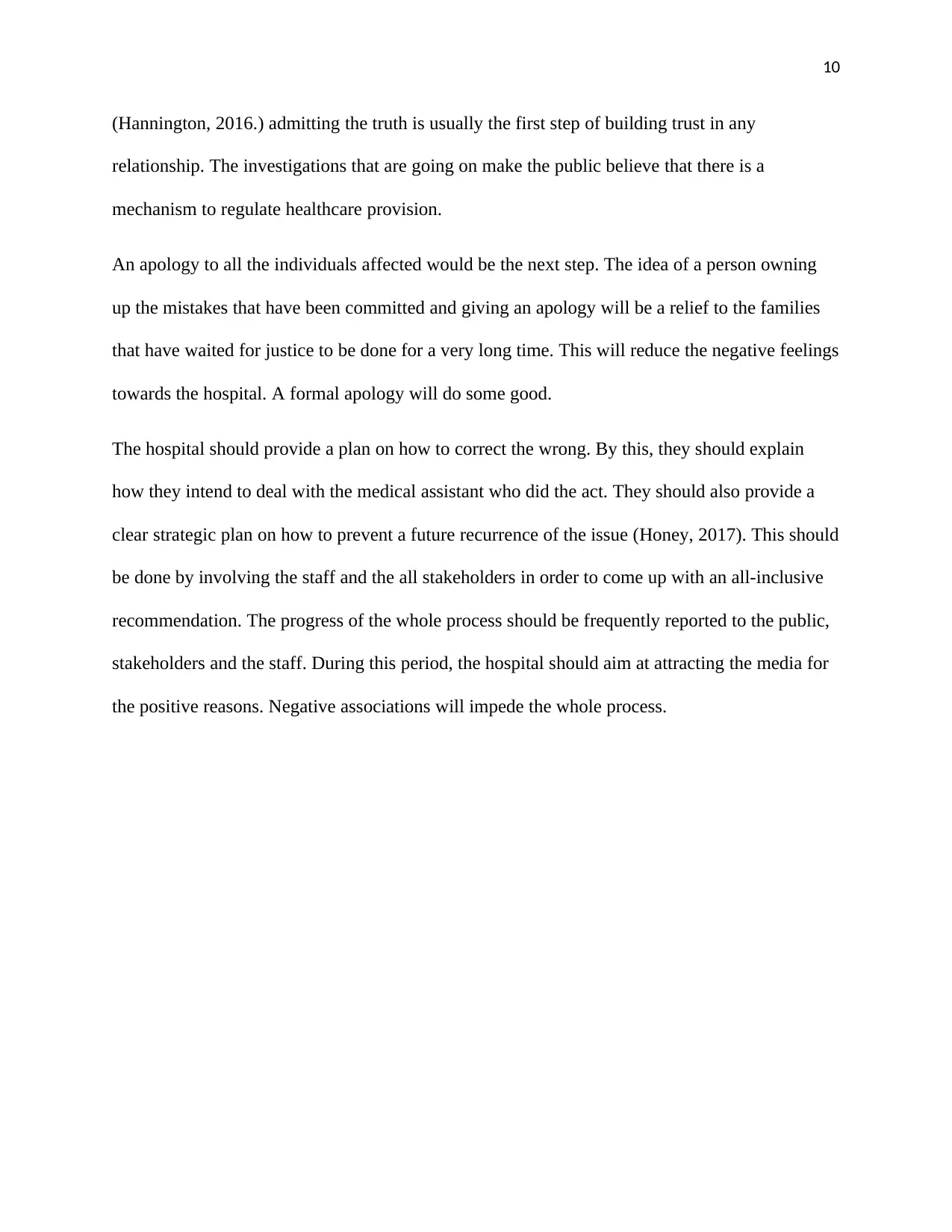
10
(Hannington, 2016.) admitting the truth is usually the first step of building trust in any
relationship. The investigations that are going on make the public believe that there is a
mechanism to regulate healthcare provision.
An apology to all the individuals affected would be the next step. The idea of a person owning
up the mistakes that have been committed and giving an apology will be a relief to the families
that have waited for justice to be done for a very long time. This will reduce the negative feelings
towards the hospital. A formal apology will do some good.
The hospital should provide a plan on how to correct the wrong. By this, they should explain
how they intend to deal with the medical assistant who did the act. They should also provide a
clear strategic plan on how to prevent a future recurrence of the issue (Honey, 2017). This should
be done by involving the staff and the all stakeholders in order to come up with an all-inclusive
recommendation. The progress of the whole process should be frequently reported to the public,
stakeholders and the staff. During this period, the hospital should aim at attracting the media for
the positive reasons. Negative associations will impede the whole process.
(Hannington, 2016.) admitting the truth is usually the first step of building trust in any
relationship. The investigations that are going on make the public believe that there is a
mechanism to regulate healthcare provision.
An apology to all the individuals affected would be the next step. The idea of a person owning
up the mistakes that have been committed and giving an apology will be a relief to the families
that have waited for justice to be done for a very long time. This will reduce the negative feelings
towards the hospital. A formal apology will do some good.
The hospital should provide a plan on how to correct the wrong. By this, they should explain
how they intend to deal with the medical assistant who did the act. They should also provide a
clear strategic plan on how to prevent a future recurrence of the issue (Honey, 2017). This should
be done by involving the staff and the all stakeholders in order to come up with an all-inclusive
recommendation. The progress of the whole process should be frequently reported to the public,
stakeholders and the staff. During this period, the hospital should aim at attracting the media for
the positive reasons. Negative associations will impede the whole process.
Paraphrase This Document
Need a fresh take? Get an instant paraphrase of this document with our AI Paraphraser
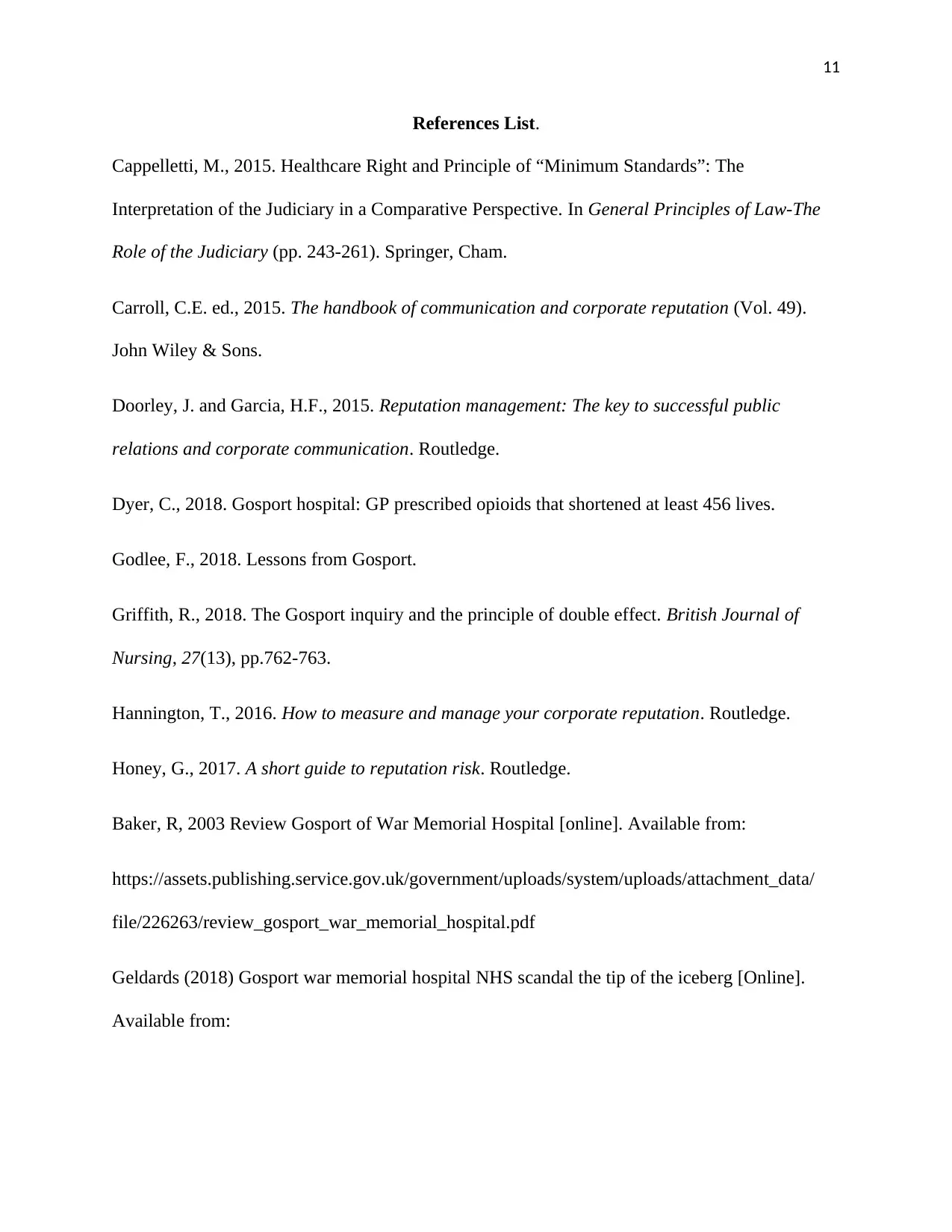
11
References List.
Cappelletti, M., 2015. Healthcare Right and Principle of “Minimum Standards”: The
Interpretation of the Judiciary in a Comparative Perspective. In General Principles of Law-The
Role of the Judiciary (pp. 243-261). Springer, Cham.
Carroll, C.E. ed., 2015. The handbook of communication and corporate reputation (Vol. 49).
John Wiley & Sons.
Doorley, J. and Garcia, H.F., 2015. Reputation management: The key to successful public
relations and corporate communication. Routledge.
Dyer, C., 2018. Gosport hospital: GP prescribed opioids that shortened at least 456 lives.
Godlee, F., 2018. Lessons from Gosport.
Griffith, R., 2018. The Gosport inquiry and the principle of double effect. British Journal of
Nursing, 27(13), pp.762-763.
Hannington, T., 2016. How to measure and manage your corporate reputation. Routledge.
Honey, G., 2017. A short guide to reputation risk. Routledge.
Baker, R, 2003 Review Gosport of War Memorial Hospital [online]. Available from:
https://assets.publishing.service.gov.uk/government/uploads/system/uploads/attachment_data/
file/226263/review_gosport_war_memorial_hospital.pdf
Geldards (2018) Gosport war memorial hospital NHS scandal the tip of the iceberg [Online].
Available from:
References List.
Cappelletti, M., 2015. Healthcare Right and Principle of “Minimum Standards”: The
Interpretation of the Judiciary in a Comparative Perspective. In General Principles of Law-The
Role of the Judiciary (pp. 243-261). Springer, Cham.
Carroll, C.E. ed., 2015. The handbook of communication and corporate reputation (Vol. 49).
John Wiley & Sons.
Doorley, J. and Garcia, H.F., 2015. Reputation management: The key to successful public
relations and corporate communication. Routledge.
Dyer, C., 2018. Gosport hospital: GP prescribed opioids that shortened at least 456 lives.
Godlee, F., 2018. Lessons from Gosport.
Griffith, R., 2018. The Gosport inquiry and the principle of double effect. British Journal of
Nursing, 27(13), pp.762-763.
Hannington, T., 2016. How to measure and manage your corporate reputation. Routledge.
Honey, G., 2017. A short guide to reputation risk. Routledge.
Baker, R, 2003 Review Gosport of War Memorial Hospital [online]. Available from:
https://assets.publishing.service.gov.uk/government/uploads/system/uploads/attachment_data/
file/226263/review_gosport_war_memorial_hospital.pdf
Geldards (2018) Gosport war memorial hospital NHS scandal the tip of the iceberg [Online].
Available from:
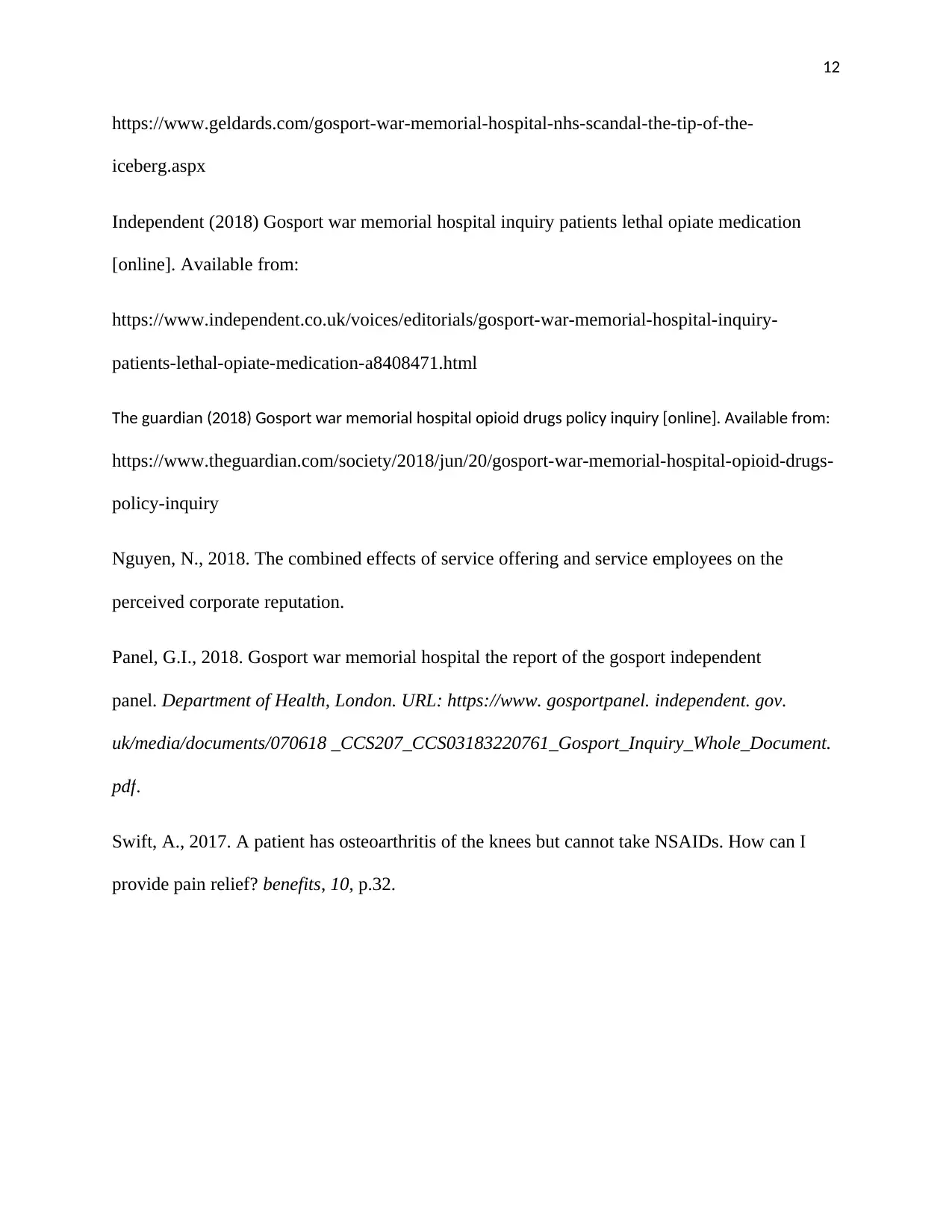
12
https://www.geldards.com/gosport-war-memorial-hospital-nhs-scandal-the-tip-of-the-
iceberg.aspx
Independent (2018) Gosport war memorial hospital inquiry patients lethal opiate medication
[online]. Available from:
https://www.independent.co.uk/voices/editorials/gosport-war-memorial-hospital-inquiry-
patients-lethal-opiate-medication-a8408471.html
The guardian (2018) Gosport war memorial hospital opioid drugs policy inquiry [online]. Available from:
https://www.theguardian.com/society/2018/jun/20/gosport-war-memorial-hospital-opioid-drugs-
policy-inquiry
Nguyen, N., 2018. The combined effects of service offering and service employees on the
perceived corporate reputation.
Panel, G.I., 2018. Gosport war memorial hospital the report of the gosport independent
panel. Department of Health, London. URL: https://www. gosportpanel. independent. gov.
uk/media/documents/070618 _CCS207_CCS03183220761_Gosport_Inquiry_Whole_Document.
pdf.
Swift, A., 2017. A patient has osteoarthritis of the knees but cannot take NSAIDs. How can I
provide pain relief? benefits, 10, p.32.
https://www.geldards.com/gosport-war-memorial-hospital-nhs-scandal-the-tip-of-the-
iceberg.aspx
Independent (2018) Gosport war memorial hospital inquiry patients lethal opiate medication
[online]. Available from:
https://www.independent.co.uk/voices/editorials/gosport-war-memorial-hospital-inquiry-
patients-lethal-opiate-medication-a8408471.html
The guardian (2018) Gosport war memorial hospital opioid drugs policy inquiry [online]. Available from:
https://www.theguardian.com/society/2018/jun/20/gosport-war-memorial-hospital-opioid-drugs-
policy-inquiry
Nguyen, N., 2018. The combined effects of service offering and service employees on the
perceived corporate reputation.
Panel, G.I., 2018. Gosport war memorial hospital the report of the gosport independent
panel. Department of Health, London. URL: https://www. gosportpanel. independent. gov.
uk/media/documents/070618 _CCS207_CCS03183220761_Gosport_Inquiry_Whole_Document.
pdf.
Swift, A., 2017. A patient has osteoarthritis of the knees but cannot take NSAIDs. How can I
provide pain relief? benefits, 10, p.32.
⊘ This is a preview!⊘
Do you want full access?
Subscribe today to unlock all pages.

Trusted by 1+ million students worldwide
1 out of 12
Related Documents
Your All-in-One AI-Powered Toolkit for Academic Success.
+13062052269
info@desklib.com
Available 24*7 on WhatsApp / Email
![[object Object]](/_next/static/media/star-bottom.7253800d.svg)
Unlock your academic potential
Copyright © 2020–2026 A2Z Services. All Rights Reserved. Developed and managed by ZUCOL.



